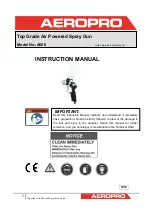
During Operation
During Operation Safety
General Safety
Use your full attention when operating the machine.
Do not engage in any activity that causes distractions;
otherwise, injury or property damage may occur.
•
Running the engine will cause engine parts,
especially the muffler, to become extremely hot.
Severe burns can occur on contact, and debris,
such as leaves, grass, and brush, can catch fire.
– Allow engine parts, especially the muffler, to
cool before touching them.
– Remove accumulated debris from the muffler
and engine area.
•
Engine exhaust contains carbon monoxide, which
is an odorless, deadly poison that can kill you. Do
not run the engine indoors or in a small, confined
area where carbon monoxide fumes can collect.
•
Chemicals are hazardous and can cause personal
injury.
– Read the directions on the chemical labels
before handling the chemicals and follow
all manufacturer recommendations and
precautions.
– Keep chemicals away from your skin. Should
contact occur, wash the affected area
thoroughly with soap and clean water.
– Wear goggles, gloves, and any other protective
equipment recommended by the chemical
manufacturer.
– The owner/user can prevent and is responsible
for accidents that may cause personal injury or
property damage.
– This machine was designed for 1 operator only.
Do not carry passengers and keep all others
away from machine during operation.
– Do not operate the machine under the influence
of alcohol or drugs.
– Operate only in daylight or good artificial light.
– Do not operate the machine when there is the
risk of lightning.
– Be aware of weather conditions and check
that spray nozzles, patterns, and volume are
suitable.
– Keep away from holes, ruts, bumps, rocks,
and other hidden hazards. Use care when
approaching blind corners, shrubs, trees, tall
grass or other objects that may hide obstacles
or obscure vision. Uneven terrain could
overturn the machine or cause you to lose your
balance or footing.
– Do not operate the machine with damaged
guards, shields, or covers. Always have safety
shields, guards, switches and other devices in
place and working properly.
– Keep clear of the discharge area at all times.
– Keep your hands and feet away from moving
parts. If possible, Do not make any adjustments
while engine is running.
•
Your hands, feet, hair, clothing, or accessories
can become entangled in rotating parts and cause
serious injury.
– Do not operate the machine without guards,
shields, and safety devices in place and
working properly.
– Keep your hands, feet, hair, jewelry, or clothing
away from rotating parts.
•
Be aware of the spreading/spraying path and
direct the discharge away from others. Avoid
discharging material against a wall or obstruction
as the material may ricochet back toward you.
•
Be alert, slow down, and use caution when making
turns. Look behind you and to the side before
changing directions. Do not spread or spray in
reverse unless it is absolutely necessary.
•
Stop spreading or spraying while making tight
turns to minimize uneven distribution pattern,
application rate, and chemical drift.
•
Chemicals may drift and cause injury to people
and animals; it may also damage plants, soil, or
other property.
•
Do not change the engine governor setting or
overspeed the engine.
•
Ensure that all drives are in neutral and engage
the parking brake before starting the engine.
•
Park the machine on level ground. Shut off the
engine, wait for all moving parts to stop, remove
key, and engage the parking brake before doing
the following:
– Checking, cleaning, or working on the machine
– Clearing blockages
– Leaving the machine; do not leave a running
machine unattended.
•
Shut off the engine, wait for all moving parts to
stop, and engage parking brake before refueling.
•
Tragic accidents can occur if you are not alert to the
presence of children. Children are often attracted
to the machine and the spreader-spraying activity.
Never assume that children will remain where you
last saw them.
20
















































